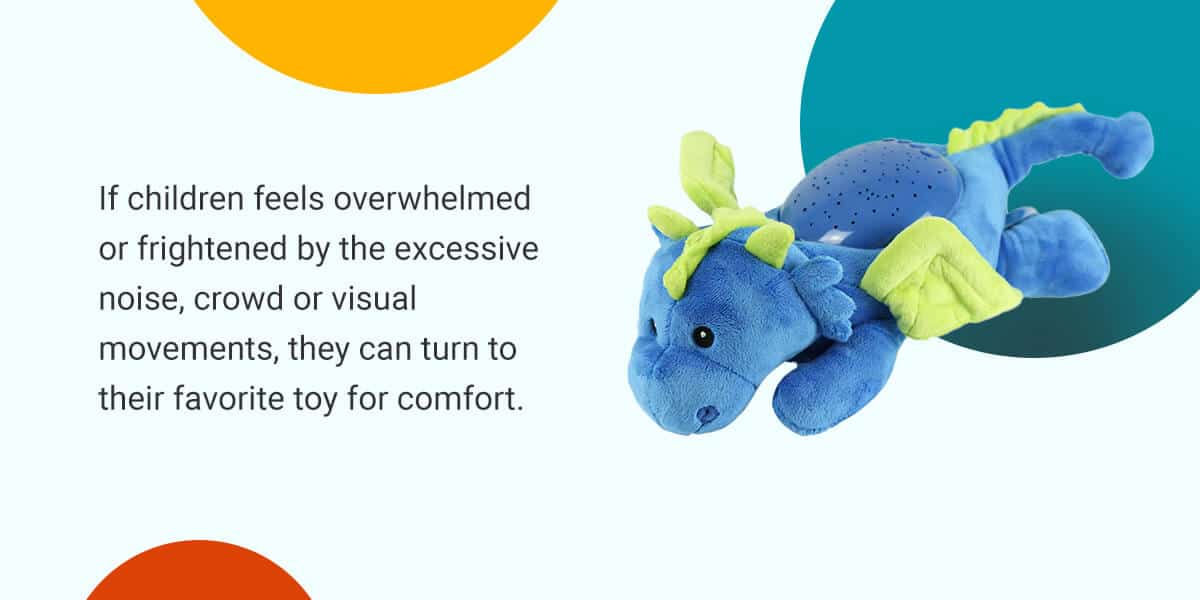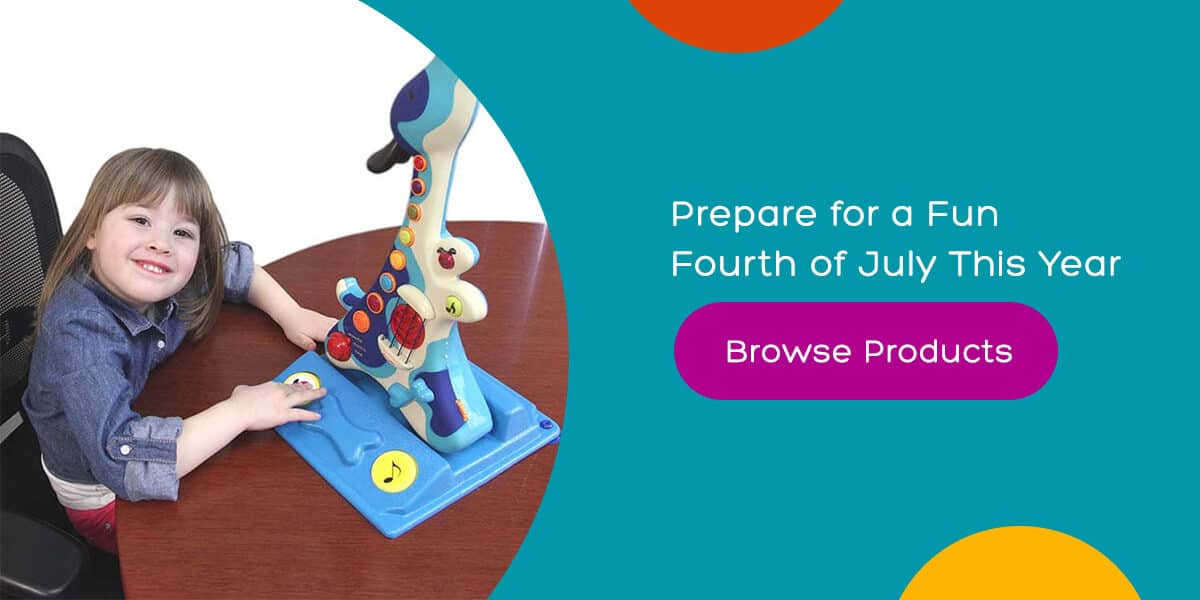The 4th of July is a great holiday to celebrate our nation’s independence with friends and family. However, for many people and animals, it’s one of the most anxiety-inducing days of the year. While the 4th of July brings joy, barbecues and celebration, it also brings loud, crackling fireworks and booming music playing from every street corner or outdoor public area. For children with disabilities, including autism spectrum disorder and sensory sensitivities, this noise can be extremely unsettling and even scary.
As a caregiver, there are not many things you can do to control the noise in public areas or in your neighborhood. However, you can make this upcoming holiday easier for your child to help them feel comfortable and safe. Here are some sensory-friendly 4th of July items to have on hand ahead of the fireworks.
1. Noise-Blocking Headphones
Sound sensitivity is one of the most common symptoms found in children with autism or special needs, which can make the upcoming holiday very overwhelming for your child. Research shows that children with autism are often more sensitive to loud noises or perceive them to be louder than others. These loud, repetitive or abrupt noises on the 4th of July can be strong irritants, so it’s important to have noise-blocking headphones or other auditory sensory products on hand that help your child feel comforted.
Noise-canceling headphones can often block out most of the noise, which is why many parents use them when taking their children to concerts. You can also give your child headphones that play soothing music or white noise if they prefer. Whether you’re celebrating from the comfort of your home or out with friends and family, having these headphones with you can provide instant relief to your child, particularly if they use alternate methods of communication.
2. Sunglasses
Bright lights are also a common sensory sensitivity for children with visual processing disorders, autism and special needs. Bright lights, including fireworks, can cause sensory overload in children and result in sensory avoidance — when your child tries to escape a situation or stimuli others can easily tune out. Studies show bright, flashing or flickering lights can significantly affect hypersensitivity in people with autism and create negative visual sensory experiences. Though all needs and sensory sensitivities differ in children with special needs and autism, they may also have difficulties tolerating:
- Particular colors
- Visual distractions
- Unpredictable movements
- Patterns
- Bright environments
When it comes to light, you might find your child keeping their eyes closed, covering them or falling asleep to avoid the glare. Sunglasses can help your child feel more comfortable in the presence of bright lights by protecting their eyes and shielding them from the sun, fluorescent lights or spotlights that might be present during 4th of July celebrations.
3. A Favorite Comfort Item, Toy or Game

Bringing familiar toys, games or a particular item your child loves can be a perfect distraction during overstimulating activities like firework shows, barbecues, parades, block parties or other outdoor events. A toy or game will also serve as something to keep their mind occupied and focus on something in their hands rather than what’s going on around them. If they feel overwhelmed or frightened by the excessive noise, crowd or visual movements, they can turn to their favorite toy for comfort.
Some examples of these items can include:
- Bubbles
- Sensory games
- Stuffed animals
- Switch adapted toys
- Fidget kits
- Musical activities
- Learning toys
4. Favorite Snacks
It’s common for children with different disabilities to be picky eaters for many reasons, including how specific foods feel in their mouths or how crunchy or soft they are. Take advantage of this and stock up on your child’s favorite snacks ahead of the holiday. During the fireworks show or at home, your child can focus on enjoying the taste, texture and flavor of their snacks instead of the environment around them.
Food can also provide a crucial distraction for your child if they are anxious about the fireworks, the sounds of people grilling nearby, excited chatter or other activities that can make them feel overwhelmed. Be sure to bring a cooler if you go out and have plenty of snack options for your child to choose from when the day arrives.
5. A Favorite Blanket
As a child, nothing is more comforting than a favorite blanket, teddy bear or stuffed toy that you take with you everywhere. Your child likely has one of these, so it’s a good idea to make sure you bring them along wherever you’ll be on the 4th of July. A favorite blanket adds even more advantages because you can use it to establish a visual boundary for your child and the rest of your family.
This gives your child their own special space to play with toys and enjoy snacks in peace and comfort and ensures no one will invade their set boundaries. If you go to a parade or similar event, your child can still use their favorite blanket to wrap themselves up and feel hidden and cozy ahead of the activities.
Other Sensory-Friendly Tips for Preparing for the 4th of July
Here are some other autism-friendly 4th of July tips to keep in mind to help your child get through the celebrations in comfort:
- Count down: Mark your calendar for the 4th of July and cross out the days leading up to the holiday with your child to get them excited about it.
- Talk it out: Let your child know something different is coming up and what you plan to do. Kids with special needs may be more prepared for the 4th of July activities if you tell them what to expect, such as where you will go and how long the festivities will last. Tell them about fireworks and what colors or sounds they might see if they have never seen them before.
- Find the right spot: Provide a safe distance from the action if your child gets overwhelmed, such as a secluded area away from the crowd. You should also remain near your car if possible in case your child wants to escape from the noise and watch the fireworks from there.
- Know their limits: Be mindful of the situation. While family memories and celebrations are important, it’s not worth your child feeling stressed. Have a plan in place with alternate activities, such as watching the fireworks at home on TV, if your child becomes too overstimulated.
- Give them ways to ask for a break: If your child uses alternate communication methods, make sure they have a special card or device that lets them alert you when they feel overwhelmed or need a break. This can make them feel more prepared and safe before engaging in any activities.
Prepare for a Fun Fourth of July This Year
This upcoming holiday should be a wonderful time for you and your family to relax and celebrate. Your child with a disability deserves to make memories and enjoy themselves, and bringing along some of their favorite items and toys can create a calming experience. There are plenty of ways to keep them feeling safe and pleasantly distracted, even in a stimulating new environment.
At Enabling Devices, our goal is to create unique products, tools and devices that help individuals with disabilities participate in community events and day-to-day activities in comfort. If you’re a parent looking to make more fulfilling experiences with your child, browse our sensory products and adaptive toys and games. We also invite you to contact us to learn more about customizing a product to fit your child’s needs.



